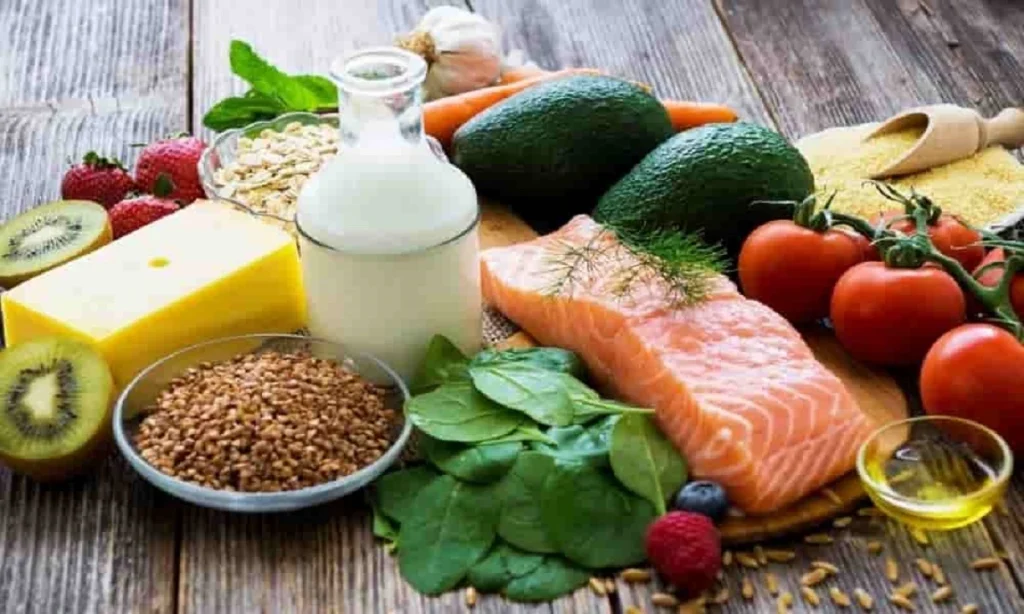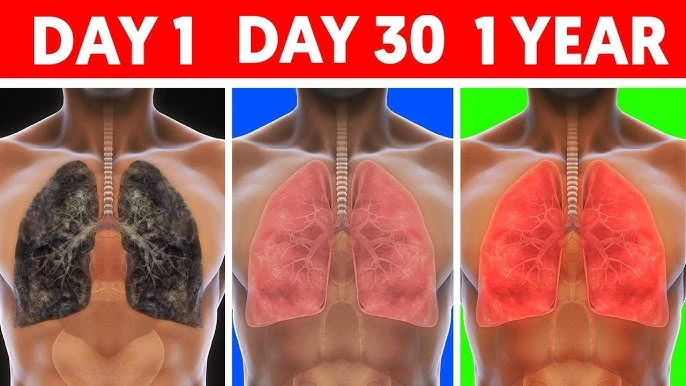
Diet After Quitting Smoking: Nutrition Tips
Many people decide to quit smoking repeatedly, but after some time, they feel the need to smoke again. It is important to realize that after deciding to quit smoking, long-term and effective decisions to maintain health should be included in people’s lifestyle. Usually, immediately after quitting smoking, the body starts to repair itself, and this process usually takes from a few days to a few years. However, the body has the power to regenerate itself, albeit over a longer period. In your opinion, what is the best diet after quitting smoking?
Proper nutrition in this situation can help the body recover its natural state faster. Whenever healthy foods are received by the body in a timely manner and in sufficient quantities, the side effects of reduced body function will be less pronounced, and the person can regain their health faster. In this article from humanhealthmag, we want to examine best and worst foods for people trying to quit cigarettes. What is best diet to follow after quitting smoking? Keep reading.
What Happens Your Body After Quitting Smoking?
Before discussing the diet after quitting smoking, it is better to see what changes the body undergoes when you quit smoking? When smoking, the absorption of vitamins and minerals such as calcium, vitamin C, and vitamin D changes. Smoking increases blood circulation, and blood vessels become narrow and sometimes blocked due to increased fat deposits. However, quitting smoking also has side effects and affects people’s energy levels and weight.
For two to three weeks after quitting smoking, people’s energy levels may drop because the body is not yet used to not receiving nicotine.Despite all these issues, about 48 hours after quitting smoking, the lungs are free of carbon monoxide, resulting in lighter breathing. Nicotine itself does not harm the body, but it causes loss of appetite and stimulates the nervous system. If you have elderly family members, it’s beneficial to remind them of essential practices of dental care for seniors.

In reality, it is the fine particles of cigarette ash and carbon monoxide that cause lung diseases, cancers, and cardiovascular problems. It is worth noting that as nicotine leaves the body, the taste of food will change; therefore, after quitting smoking, a person’s desire to consume different foods and tastes increases, and at this stage, the risk of excessive weight gain is high. Additionally, taste and smell improve about 48 hours after quitting.
Are Tomatoes Good Diet After Quitting Smoking?
Consuming more tomatoes and other types of fruits can help improve lung function that has been diminished by smoking. In a 10-year study of 650 people who had quit smoking, lung oxygen uptake capacity was measured immediately after quitting and ten years later. The results showed that in people who consumed two tomatoes or three servings of fruit per day during this period, a higher percentage of lung function was recovered.
The results of this test showed that even for non-smokers, eating tomatoes and fruit helps improve lung function with age and during old age, and reduces the chance of respiratory diseasesn & fatigue in older adults. Therefore, it was recommended that people try to include fresh fruits and vegetables in their daily diet more than ever in the months after quitting smoking. Including fruits and vegetables in your diet can restore nutrients and may help with reducing cravings to smoke.
What Vitamins Should I Take After Quitting Cigarettes?
Research has shown that the continuous introduction of nicotine into the body destroys many of the body’s vital vitamins, and nicotine replaces them. Therefore, in many smokers, the level of vitamins in the body, especially vitamin C, vitamin E, and B vitamins, is lower. Smoking a single cigarette consumes about 25 mg of vitamin C in the body, which is not easily replaced.
Since vitamin C is a very powerful and necessary antioxidant for the body, consuming foods containing this vitamin can repair the damage caused by the lack of antioxidants to body tissues. Another function of vitamin C is to purify damaged cells in the body. In addition to tomatoes, citrus fruits, cantaloupe, broccoli, cauliflower, and red pepper are good sources of antioxidants.

B vitamins play a fundamental role in the central nervous system1. These vitamins can effectively reduce people’s unnecessary stress, which is one of the side effects of quitting smoking. Consuming B vitamins found in potatoes, nuts, bananas, grains, dairy products (especially low-fat yogurt), red meat, eggs, shrimp, and fish reduces stress, increases energy levels, and generally improves the functioning of the body’s nervous system.
Finally, consuming vitamin E also helps the individual to absorb the maximum amount of oxygen. Also, consuming this vitamin, which is found in almonds, spinach, sunflower seeds, etc., reduces the risk of developing some types of cancer and makes the skin brighter.
After quitting smoking, it is important to focus on vitamins such as B12, C and E. Vitamin C can be found in broccoli, red bell peppers, oranges, and tomatoes, and aids in detoxification. Vitamin E, found in sunflower seeds, almonds, and spinach, helps the body use oxygen better and protects against damage from smoking.
Why Should You Reduce Caffeine After Quitting Smoking?
For up to three weeks after quitting smoking, drink plenty of water to help flush out as many toxins and waste products remaining from smoking as possible. Nicotine and toxins from smoking are eliminated from the body through the kidneys in the form of urine.
Also, drinking plenty of water fills a large volume of the stomach and prevents weight gain after quitting smoking. One of the problems people face after quitting smoking is excessive weight gain. After drinking coffee and caffeinated beverages, a person is tempted to light a cigarette. It is best to avoid these drinks for a while after quitting smoking so that there is no way for nicotine to return to the body.
A good alternative during this period is healthy herbal teas instead of tea and coffee, which can restore the body’s lost energy.

Diet After Quitting Smoking
When quitting smoking, consider incorporating these foods into your diet:
- Consuming whole grains can stabilize blood sugar levels, reducing cravings and providing a steady source of energy. Examples include oatmeal, brown rice, and whole-wheat bread.
- Fresh fruits and vegetables, especially those rich in Vitamin C (such as oranges, strawberries, red bell peppers, and tomatoes), can help reduce cravings and improve overall health. They aid in detoxifying the body and replenishing essential nutrients depleted by smoking.
- Legumes like beans, lentils, and chickpeas are high in protein and fiber, helping you feel full and reducing cravings for unhealthy snacks26. They also stabilize blood sugar levels.
- After quitting smoking, consume more vitamin B12, found in shrimp and low-fat yogurt, as it is essential for the nervous system.
- Add broccoli to your diet to help cleanse the lungs of toxins, including nicotine. It is rich in sulforaphane, which aids in healing the lung.
- Chewing raw ginger or drinking ginger tea can alleviate withdrawal symptoms like nausea and cravings.
- Nuts and Seeds, Almonds, sunflower seeds, and flaxseeds are rich in healthy fats and proteins that help stabilize blood sugar levels and reduce nicotine cravings.
Concluding Remarks
A well-planned diet is crucial when quitting smoking. Focus on incorporating plenty of fruits, vegetables, whole grains, and lean proteins to help manage cravings, stabilize blood sugar levels, and support overall health. Staying hydrated with water and herbal teas can aid in detoxification and prevent weight gain. It’s also beneficial to be mindful of triggers and replace smoking-related habits with healthier alternatives, such as snacking on carrot sticks or chewing sugar-free gum. Remember, the health benefits of quitting smoking far outweigh any concerns about potential weight gain.
Your feedback is the secret ingredient to improving our content! Comment below and let us know how this post resonated with you. We want to hear ALL your ideas!

Frequently Asked Questions
What Types of Foods Should I Avoid to Prevent Weight Gain While Quitting Smoking?
To minimize weight gain, it’s best to avoid processed foods high in sugar and unhealthy fats, such as soft drinks, chips, candies, cakes, and fried foods. These foods can trigger cravings and lead to overeating. It’s also wise to limit alcohol and caffeinated drinks, as these can be associated with smoking for some people.
What Are Some Healthy Snack Options to Manage Cravings and Hunger After Quitting Smoking?
Healthy snack options include high-fiber foods like air-popped popcorn, whole-grain crackers, carrot sticks, celery sticks, apples, and grapes. Nuts can also be helpful. These choices provide fullness without adding excessive calories or unhealthy fats. Eating 4 to 6 small meals during the day can also help stabilize blood sugar levels and prevent cravings.
Are There Any Specific Dietary Changes That Can Help Improve My Health After Quitting Smoking?
Yes, focus on incorporating foods rich in vitamins and antioxidants to help your body recover from the effects of smoking. Good choices include citrus fruits, berries, broccoli, and tomatoes, which are high in vitamin C. Additionally, consider including foods rich in vitamin E, such as almonds and spinach.
